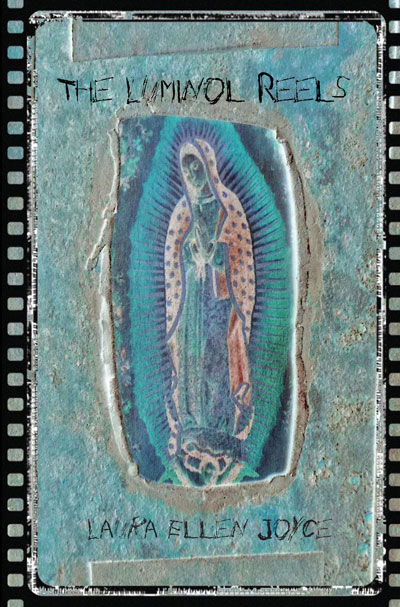
The Luminol Reels
Laura Ellen Joyce
97 pages, paperback
ISBN 978-1940853048
Calamari Press, 2014
Review by Elizabeth Mikesch
The Luminol Reels queers guidance. To read this book is to be induced to squat above a sororal cistern in a hiked-up dress. Authoritative, excessive, and grotesque, Joyce destabilizes that trend where people write saccharine shit in technical language, which is something some writers do to endear themselves to readers when they have pissants for feelings. Is that a trend, or is that something that exists as my enemy theoretically? Let’s hope it’s an hallucination.
A feminist separatist added me the night I got dumped. She sent me on Internet missions to expose male “feminists,” Public Enemy #1. I was to describe minutely how I would obliterate penis-havers manning feigned support through prolonged psychological and physical torture. In equal parts, I was also to create a utopian lesbian world where no boys were allowed. Not only did she link me to the SCUM Manifesto, she also checked in with me almost daily about my progress as a destroyer. It was gratuitous, and it was rad.
We had assignments like seducing guys online to recruit them in case armies of us could overthrow the patriarchy. If I hadn’t drummed up something damaging enough that day, I was prodded and guilted. Did I support rape? Did I want to give satisfaction to rapists by not, with the help of my sisters, embarrassing, demeaning, and publically executing men all over the world? I was sent pictures of women burned with lye or by fire. I was sent Facebook messages describing the leader and other members’ experiences being gang raped, trafficked, locked in basements. What could be direr than my daily dose of the disadvantages of damseldom?
Nothing real happened IRL, but the invitation to embrace hatred and dement others as a girl gang of feminist terrorists using wits and wiles took me places.
It’s hard to make political work that makes you go damn. I don’t like soapbox writing. It’s pretentious. Joyce’s work dares you. It doesn’t give a fuck about its being because it’s already bleeding out in the sand. The directive serves as a hard bar to rattle rules within the world of The Luminol Reels. Each page has headings like a manual, on how to accept and rewrite your life as the dreams your mother had the day you were fired from being part of her. It tells you how to tell someone who tells you what to do what to do while overdosing.
Gender develops through the language. The horror of dividing, categorizing, and acting out hyperfemininity with kitsch is like the longest, coldest night of the year. The titles are those of made-up saints, times of the month, medical procedures, heavy verbs, and weapony nouns. Even the subheadings, italicized, hiss out affectations to the to-do lists. The work is hellishly vibratory, liquefied by toxic, unclear characters, set in made-up seasons in the darkness in the desert. Gore, self-harm, murder, bulimia, forced sex, gestation, purging, cannibalism, and excesses of color lighting up in the darkness of the setting and the language itself makes the message that life is a massacre.
Here’s a blip from “Lobotomy”:
He was the last one, the last one but for me and the baby. And the baby was months away. His eyes were blue from the acid. It scalded the jelly down to nothing, exposed the now faulty veins and nerves. Bluish juice dripped down and a sharp, hot stink rose. He was, I was, we were charged. A sizzle of electricity ran down the walls, the wiring came away in blackened peels, hot plastic oozed melts of colour down the paint—it was a room full of nausea and rot.
Joyce knows how to scramble the stomachs of readers. Constantly illuminating the body, a terroristic snapshot of her subversive imaginings pangs prettily.
I can already hear the haters regarding cognizance. That’s why I started calling plot “plop”. Gender is a plot we’re trying to memorize, but Joyce overdubs it and makes all those acronym shows about sex crimes and dead women much more amniotic and amnesiac. It’s like you’re being told how to survive after reliving your virginity, rape, impregnation, gestation, stillbirths, births, child rearing, and your death; and knowing that you have several lives you must redub over those. The instructive spirit goth vocals have the familiarity you need to talk you home on the side of the road while you pee your boots in the rain to come home to just some couch. There’s a lo-fi feel to this where I don’t want to know what Joyce is saying, I just want to feel fucked up.
______________________________________
Elizabeth Mikesch is the author of Niceties: Aural Ardor, Pardon Me (Calamari). Her work has or will soon appear in BOMB, Black Warrior Review, The Quietus, Son of a Book, and Sleepingfish.